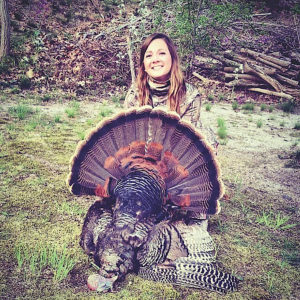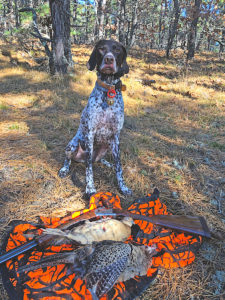
As upland game season wraps up on Nov. 30, many local hunters worry that a longstanding tradition of pheasant hunting will soon be ending.
Following a 2002 court challenge by animal rights groups, the National Park Service is expected to begin phasing out the state’s practice of pheasant stocking, in which non-native ring-necked pheasants are released for sport shooting each fall. The court challenge triggered the Park Service to issue a 200-page environmental impact statement in 2007 that suggests pheasant stocking will be phased out sometime between 2021 and 2024.
The decision will be “dependent on determinations relative to other upland game species, specifically quail,” said Cape Cod National Seashore Supt. Brian Carlstrom, who added that ending the pheasant-stocking program is “likely but has not yet been determined.”
Pheasants are the only birds stocked at three sites on the Outer Cape, though the upland game category also permits hunting of a long list of indigenous and naturalized species, including ruffed grouse, quail, woodcock, and turkeys.
David Scarpitti, who serves as the turkey and upland game project leader for the Mass. Div. of Fisheries and Wildlife, said that pheasants are stocked at “dozens and dozens” of sites throughout the state. All of the sites on the Outer Cape are in the National Seashore, so state stocking will effectively stop here once the Park Service announces the official end of the phaseout. Currently about 700 pheasants are released over the course of the annual fall season in the Seashore.
“We stock in a few other places on the Cape,” Scarpitti said. “We contract with vendors that propagate pheasants. Those birds are delivered to our office locations and our staff distributes them across the state, including sites in Dennis, Cotuit, and Falmouth. And our statewide stocking program will continue.”
Carlstrom said that the Park Service is committed to continuing to allow the hunting of other species in accordance with Mass. Dept. of Fish and Game regulations.
The Hunter-Dog Connection
“I don’t come from a hunting background — no one in my family hunted — but a friend from the Midwest got me into upland hunting, and then I went down the rabbit hole,” Patrick Rickaby of Truro said. Rickaby, who hunts with an English springer spaniel, said that the hunter-dog connection is a huge part of upland bird hunting.

“There are two types of dogs — pointing and flushing,” Rickaby explained. “Mine is a flushing breed, so their job is basically to use their nose to sniff out a bird. It’s bred into their nature to literally scare the bird into the air and flush it up. Then, theoretically, I shoot the bird and it lands somewhere, and then the dog retrieves it.”
Pointing dogs, in contrast, sniff out birds and point to them with their noses. They will “hold point” to exactly where a bird is while the hunter walks toward it and flushes it into the air. Like a flushing dog, a pointing dog will then retrieve the bird after it hits the ground. “I hunted with other people’s dogs for years before I had my own,” Rickaby said. “I didn’t realize what I was getting into. It takes about a year of basic training and then four years of constant training until you have a dog that really works perfectly at your side.”
Corey Brundage of Wellfleet said that between Saturday of OysterFest weekend and the Saturday after Thanksgiving, when pheasants are stocked, he regularly hunts the birds in the woods off High Toss Road. He learned how from fellow Wellfleet resident John Fitzgerald, who’s been hunting birds on the Outer Cape since he moved here 35 years ago. “When I came here, there were a lot of wild quail, which seem to have vanished,” Fitzgerald said. “By 15 years ago you rarely saw them. They used to be all over Eastham. I have a charter boat and I fish out of the Pamet River, and sometimes when it’s just getting light in the spring, I still hear them.”
Fitzgerald speculates that habitat changes may explain the decline, a theory shared by the American Bird Conservancy, which describes the ideal habitat of the species as “old fields and hedgerows, grasslands, and open forests.” Bobwhite quail have declined 85 percent throughout their American range between 1966 and 2014, according to the North American Bird Breeding Survey.
Fitzgerald said that in addition to pheasants and quail he also enjoys hunting woodcocks. “I see quite a few of these native [woodcocks], but it takes forever for the migratory flights to come in, because it’s getting cold up north later,” he said, referring to the fact that woodcock spend the warmer months in southern Canada and don’t migrate south to our region until the ground freezes further north. The woodcock season in Massachusetts ran this year from Oct. 3 to Nov. 23. “Woodcock season opens earlier than pheasant season, but by the time it gets really good, it’s closing,” Fitzgerald said. “It’s got to be something to do with climate change, because it’s shifting.”
Some local hunters are turning to turkey hunting as an alternative to pheasant. “They are completely different,” said Eastham resident Sadie Hill, who hunts both birds. While species like pheasant, quail, and ruffed grouse are hunted with dogs — or, in some cases, trained falcons — turkey hunting requires scouting and decoys. “When we go turkey hunting,” said Hill, “we’ll get up at o-dark-thirty and drive the National Seashore roads and stop the car and call, and they’ll gobble back to you.” That’s how you locate generally where they’re going to be.”
Hill then sets up a hen decoy to lure toms out of their roosts in the trees. Scarpitti said he expects the turkey population is still increasing on the Cape, based on “the number of phone calls and complaints I get from people about seeing too many.” But he agreed that turkey hunting is wildly different from pheasant hunting, and is not necessarily going to fill the void. “There’s a lot of disappointment, but it’s also very vague,” Brundage said. “Each year it’s like, ‘OK, are they stocking?’ A lot of us have dogs that are part of our family, part of what we do. I’ve been down to Provincetown, and there’s people of all ages. It would be a shame for all that to go away.”



